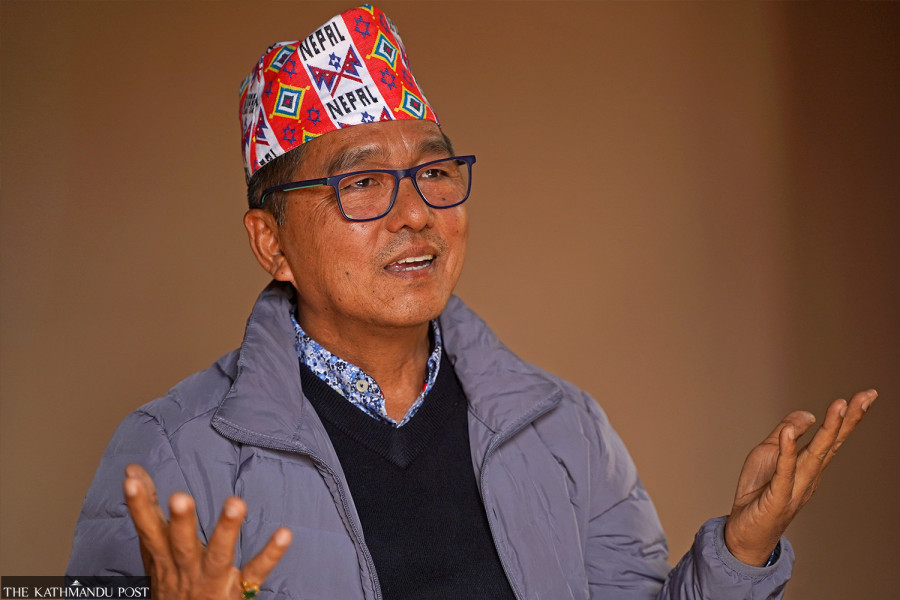Politics
RPP’s double standard plays out in Koshi Province
After announcing protests against federalism and secularism, the pro-monarchy force claims Speaker position in the province.
Post Report
The Rastriya Prajatantra Party on Tuesday announced nationwide protests against secularism, federalism and republicanism, the major political achievements of the 2006 people’s movement institutionalised in the 2015 Constitution of Nepal.
A three-day central committee meeting of the right-wing party, which is the fourth-largest in the federal parliament, announced that it would start the ‘Mechi-Mahakali unity march’ and Kathmandu-centric demonstrations for a month from mid-February demanding that federal structures be scrapped and Nepal reinstated as a Hindu kingdom. While the party’s central leadership was busy devising a strategy for the protest, its provincial leadership in Koshi was in talks to secure the Speaker's position in the provincial assembly.
The Nepali Congress-led ruling alliance has offered the Speaker’s position to the RPP in exchange for its support to the government. “The ruling alliance has offered the Speaker’s position to our party,” Bhakti Sitaula, the RPP parliamentary party leader in the province, told the Post. “We are ready to accept the position if all the parties unanimously make the offer.”
With 40 seats, the CPN-UML is the largest party in the assembly. The Congress has 29 seats, the CPN (Maoist Centre) 12, the RPP six, the CPN (Unified Socialist) four, and the Janata Samajbadi Party has one seat.
Kedar Karki was appointed chief minister as per Article 168(5) of the constitution, under which a provincial assembly member can claim the chief ministerial position by producing the support of the majority members. This is the last option for the formation of a government.
The ruling alliance has 47 seats in the 93-strong provincial assembly. However, it will not be possible to prove the number in the floor test given the deputy Speaker abstains from the voting process and the senior most member from the alliance needs to chair the assembly. The previous Uddhav Thapa government fell due to the same reason.
Karki’s government will be stable if the RPP extends its support. “There is a practice that opposition can make a rightful claim to the Speaker’s position,” Sitaula told the Post. Asked if it wasn’t ironic for the party wanting to scrap the provinces to claim the Speaker’s position, Sitaula said: “Our party has a strategy to use both the street and parliament to its benefit.”
Sitaula might have claimed they are looking for a unanimous offer from all the parties to take the Speaker’s position. If victory is assured, Ambar Bista, the party’s senior-most member in the provincial assembly, may stand for the position.
As the largest party, the UML, too, is eyeing the Speaker’s position. As Karki became the chief minister with its support, the UML expects him to agree to its proposal. Rewati Raman Bhandari, the UML chief whip in the assembly, said he hopes the Speaker will be from his party.
Currently, the UML holds the deputy Speaker’s position. It has to give up the position as per the constitution to claim the Speaker’s post. Article 182 (2) of the statute says there should be one woman out of the provincial Speaker and the deputy Speaker, and the two must be from different parties.
It is ready to give up the deputy Speaker’s position to take the Speaker position. However, no other party is likely to back up the UML’s candidate if the RPP contests the position.
A provincial assembly member elected from the anti-federal pro-monarch party is the Speaker in Bagmati Province as well. Political experts say the RPP’s dual game is a perfect example of political morality lacking among the parties in the country.
“It seems the party is still in transition,” Sanjeev Humagain, chief of the MPhil programme for social science in the Nepal Open University, told the Post.
“When civil society is too weak to question parties, they don’t hesitate to take any step. The RPP’s position to protest against federalism and claim the Speaker’s position in the provincial assembly simultaneously speaks volumes of our political forces.”
The party’s leadership, however, defended the move saying as long as it is in the provincial assembly, making maximum benefit out of it is natural. “We will scrap the provinces the day we have enough numbers in Parliament [adequate lawmakers to amend constitution],” Mohan Shrestha, the RPP’s publicity department chief, told the Post.




 13.12°C Kathmandu
13.12°C Kathmandu













